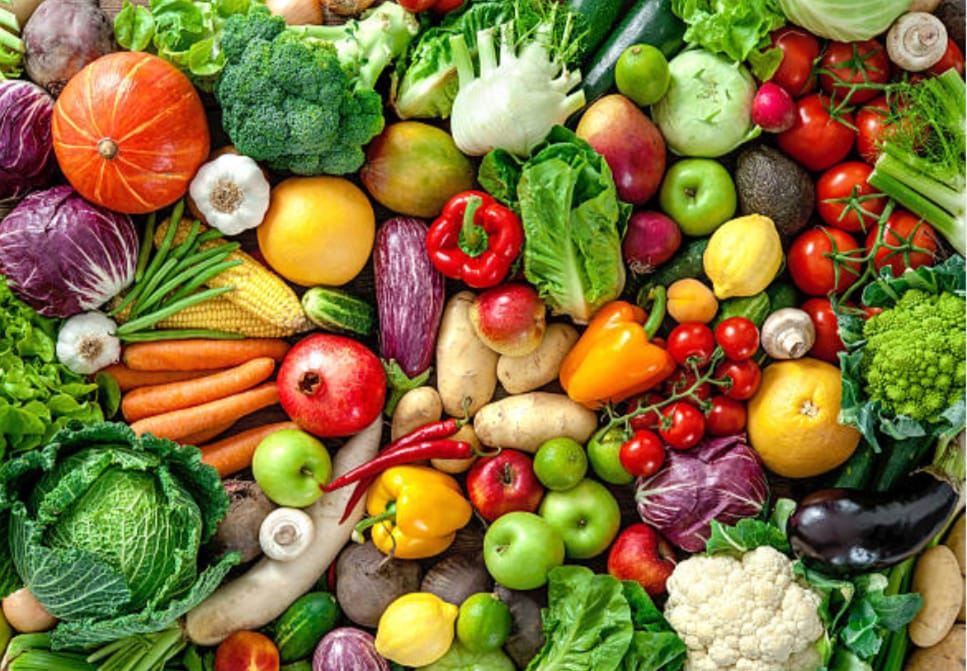Hair and Nutrition: A Strong Connection
Hair health is closely linked to proper and balanced nutrition. For healthy and strong hair, there must be right balance of vitamins, minerals, and proteins. They help to have strong, shiny hair. However, a deficiency of these essential elements affects negatively on our hair structure and hair growth. As a result, it leads to hair thinning, hair breakage, and even hair loss. Therefore, healthy foods for healthy hair with right amounts of nutrition is essential for strong, shiny hair. Foods for healthy hair include eggs, nuts, spinach and salmon etc. These are rich in proteins, vitamins and omega-3 fatty acid. it is rightly said that “Invest in your hair, it’s the crown you never take off.”

NUTRIENTS AND FOODS FOR HEALTHY HAIR
Protein For Hair Health:
To begin with, Protein is the building block of hair. In fact, hair is mostly made of a protein called keratin. This special protein also forms the outer layer of the human skull, hair, and nail. Keratin makes hair smooth and strong. Since hair is built almost entirely of keratin, proper amount of protein is essential for healthy hair growth. If the body does not get enough protein, the hair follicles produce weaker keratin. As a result, there is weak, easily damaged hair. Your body needs enough protein for hair to grow back and stay healthy..
The Recommended Dietary Allowance (RDA) for protein is 0.8 to 1 gram per kilogram of body weight. Good sources of protein include:
- Animal-based proteins: Eggs, meat, fish & dairy products.
- Plant-based protein: Lentils and beans, nuts and seeds, whole grains etc. In fact, these foods are rich in amino acids. Therefore, they support hair strength and growth.
Vitamins: Role of Vitamin A
First of all, Vitamin A is essential for healthy, shiny hair. The body primarily obtains it from beta-carotene. This is found in fruits and vegetables. After getting beta-carotene, the body converts it into active vitamin A.
Vitamin A helps to make sebum. It keeps hair soft and moist.
However, this conversion depends on proper thyroid function. If the thyroid is not functioning well, the process may be inefficient. Thus, it may lead to poor hair quality. Therefore, people with low thyroid function may benefit from supplementing with 10,000 to 25,000 IU of vitamin A daily. However, pregnant women should take it under medical supervision.
Vitamin A rich foods for healthy hair- carrots, sweet potatoes, spinach, papaya, mango, liver of animals etc.
How Does Vitamin B Complex Help?
Moreover, B-complex vitamins are essential for healthy hair. Folic acid, B12, and pantothenic acid are especially important for hair growth and strength. In addition, inositol may also help to keep hair healthy.
Biotin (Vitamin B7) supports and improves production of keratin. It can reduce hair thinning and breakage
Some important foods for healthy hair with Vitamin B are eggs, almonds, sweet potatoes, mushrooms, nuts and whole grain etc.
How Can Foods for healthy Hair with Vitamin C, D & E Help in Healthy Hair?
Furthermore, Vitamin C is another important nutrient for hair. It aids hair health reducing hair loss. Vitamin C helps in the production of collagen. It also helps in absorption of iron. Therefore, it can prevent premature graying of hair.
Vitamin C rich foods for healthy hair include-Citrus fruits, bell peppers, strawberries, kiwi, leafy vegetables etc.
Likewise, Vitamin D is also an essential nutrient for hair. It supports in hair follicle regeneration. Without it, one may experience hair thinning. Also, there may be slow growth and even alopecia.
Natural and best sources of Vitamin D are sunlight, fortified dairy, flesh of fatty fish, fish liver oil, egg yolks, mushrooms etc.
Vitamin E is also another essential nutrient for hair health. This improves blood circulation in the scalp. Also, it protects hair from oxidative stress.
Foods for healthy hair with Vitamin E include nuts, sunflower seeds, spinach etc.
Minerals For Hair Health:
In addition to vitamins, minerals also play a key role in hair health. Some of the most important minerals are:
- Iron: Iron helps in preventing hair loss. In fact, iron deficiency is a common cause of hair loss, especially in women.
- Zinc: Moreover, zinc is another essential mineral for hair. It is an important mineral. This mineral controls the oil glands around follicles. Zinc can strengthen hair also. If you do not have enough zinc in your foods, it can lead to hair shedding and a flaky scalp.
- Selenium and Copper: These minerals support hair structure and growth of hair. However, body levels of minerals should be balanced. It means that the body requires right levels of each mineral—not too much and not too little—to function properly.
Omega-3 Benefits for Hair:
- Omega-3 nourishes hair follicles.
- It provides essential nutrients to strengthen hair. Omega-3 can support growth of hair.
- This esssential fatty acid can also reduce Inflammation. It prevents scalp conditions like dandruff and hair thinning.
- Besides, Omega-3 also prevents dryness in hair. This fatty acid can strengthen hair strands and improve elasticity of hair.
Best foods for healthy hair with Omega-3 include fatty fish like salmon, mackerel, sardines, and tuna. Walnuts, flaxseeds, chia seeds, hemp seeds also contain a good amount of Omega 3.
Antioxidants for Hair Health:
Equally important are the antioxidants. These can protect hair from damage.
- Vitamin A, C, E, D, mineral like Zinc and Selenium, along with Coenzyme Q10 (CoQ10) protect hair follicles from oxidative stress.
- Oxidative stress can cause hair thinning. This can also lead to premature graying, and scalp issues.
- Antioxidant neutralizes free radicals, which damage hair cells and lead to hair loss.

Some other important facts to know:
Gut-Hair Connection:
Interestingly, there is a significant relation between gut health and hair health. If foods taken are not digested well, the body will not get the required protein, vitamins, and minerals. A balanced gut microbiome-
- supports healthy hair growth
- prevents hair thinning
- reduces hair loss, and
- prevents poor scalp health.
For healthy hair, there is the need of nutrients like vitamin A, B, C, D, E, and biotin, zinc, iron, etc. Only a healthy gut can ensure proper absorption of these essential ingredients. Problems like low stomach acid or poor pancreatic function can reduce digestion and metabolism. It negatively affects your hair. Therefore, it is a must to avoid poor eating habits or tendency for overeating.
In fact, a healthy gut is important because it helps to control hormones like androgen and cortisol. These hormones affect hair growth and scalp health.
Healthy Circulation:
Furthermore, healthy blood flow is very important for hair growth.
Proper Blood circulation ensures:
- sufficient oxygen
- necessary nutrient supply to the hair follicles. Key nutrients like antioxidant, essential fatty acid, vitamin B6, vitamin B12, iron, folic acid etc. support proper blood circulation. They support red blood cell production and keep arteries clear.
In addition to all these, regular physical exercise is highly important. A nutrient-rich diet along with regular physical exercise confirms proper blood circulation. As a result, it gives nourishment to the scalp and hair follicles. This ultimately works in having strong and healthy hair.
Avoid Sugar:
Meanwhile, eating too much sugar can disturb the body’s nutrient balance. If we take sugar too much, there is the chance for
- hair thinning
- premature graying and scalp issues
- inflammation
- hormonal imbalances and
- poor nutrient absorption. Eating too much sugar can disturb the balance of vitamins, minerals and protein in your body. Subsequently, it can slow down healthy hair growth. Therefore, in order to keep your hair healthy and strong, it is best to avoid too much sugar.
Avoid Caffeinated Drinks:
According to research, too much caffeine from tea and coffee can harm hair health. Though caffeine increases blood circulation to the scalp, too much caffeine can raise cortisol (stress hormone) levels. High cortisol level can cause hair thinning and shedding. Also too much caffeine affects sleep. Poor sleep reduces hair follicle recovery and weakens hair growth. Therefore, think twice before taking too much caffeine.
To Sum up:
- Avoid (or limit) sugar and caffeine intake.
- Exercise regularly- It helps in overall well-being and balances stress hormones.
- Sleep Well – Quality rest/sleep is essential for hair health and sound health and mind.
- Eat enough protein – Hair is primarily made of protein. Ensure a daily intake of protein-rich foods.
- Eat healthy fats – Ensure essential fatty acids in your diet. They contribute to strong, shiny hair.
- Stay hydrated and eat nutrient-rich foods – Water, fruits, and vegetables provide vital vitamins and minerals.
- Approach a Health Professional – A healthcare expert can help you. Know facts like hormonal balance, digestion, and circulation.



This is incredible, Prasanta!
Thank you for doing this and sharing.